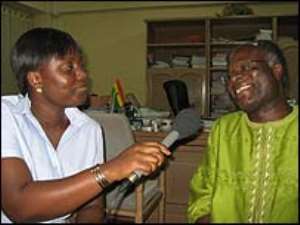
Ghana's energy crisis began last August - and continues today, with estimates that it could cost the country's economy millions of dollars.
As the winner of the BBC's NewsMaker competition - I am more usually a teaching assistant at Kwame Nkrumah University of Science and Technology - I wanted to investigate the cause and effect of the energy problem.
It has been attributed mainly to the dwindling water levels in the Volta Lake at Ghana's only hydroelectric plant, Akosombo Hydro.
However, the obsolete and poorly-maintained equipment, used for generations, and the distribution of electrical power in the country, could also be blamed. The country continues to suffer from frequent power cuts.
Recent research by Data Bank, one of Ghana's leading financial providers, suggests the country could lose up to $1.4 billion by the end of the year if the situation does not improve soon.
And Ghana's National Labour Department statistics show that about 33 companies filed for insolvency between September 2006 and March 2007 and over 2,300 workers have lost their jobs.
Bitter complaints
While the power crisis cannot be directly accountable for these figures, no-one would argue that it is not a contributing factor.
Families are also feeling the impact - going through financial crisis due to the laying off of workers. Some told me they are being torn apart, the education of their children being affected as they struggle to pay school fees.
The people I spoke to in the capital Accra are fed up with the situation, and the youth in particular are losing confidence in the government's ability to solve the problem.
They say nobody knows who and what to believe anymore.
On the streets, they complain bitterly. I was told quite simply that life was uncomfortable with the unreliable power supply.
Desperation and confusion can be felt among people and businesses in Ghana - which is really bad news for the country which is seen to be the beacon of Africa.
Ghana's Deputy Energy Minister KT Hammond told me he sympathised, and assured the public that the government had the situation firmly under control. He said it had put in ardent measures to solve the problem.
And Deputy Information Minister Oboshie Sai recently told Ghanaians that the energy crisis would be over by 30 September this year.
But this is not the first time a government official has put out a date by which the power crisis should cease. The government continues to do its best to allay fears and offers assurances that it is trying its hardest.
But many question whether its best enough to end the discomfort of the people of Ghana?




 Prince Harry, Meghan visit Nigeria
Prince Harry, Meghan visit Nigeria
 Ghana’s electoral commission is one that trusts thieves — Omane Boamah
Ghana’s electoral commission is one that trusts thieves — Omane Boamah
 All government cares about is spending more and more money on itself — Dalex Fin...
All government cares about is spending more and more money on itself — Dalex Fin...
 COVID-19: GHS records 57% vaccination coverage
COVID-19: GHS records 57% vaccination coverage
 My government will support churches – Bawumia assures Clergy
My government will support churches – Bawumia assures Clergy
 Mahama, Bawumia and Alan have flatly failed Ghanaians – Kofi Akpaloo
Mahama, Bawumia and Alan have flatly failed Ghanaians – Kofi Akpaloo
 PAC warns public institutions to comply with the Public Procurement Act
PAC warns public institutions to comply with the Public Procurement Act
 Voter registration: NDC slams EC’s refusal to share serial numbers of BVR kits
Voter registration: NDC slams EC’s refusal to share serial numbers of BVR kits
 Akufo-Addo's 'corrupt, yenkyendi cronyism' cost Ghana $190m stake in US Millenni...
Akufo-Addo's 'corrupt, yenkyendi cronyism' cost Ghana $190m stake in US Millenni...
 Don't be 'conduit' to President Akufo-Addo's 'I can't hand over power to Mahama'...
Don't be 'conduit' to President Akufo-Addo's 'I can't hand over power to Mahama'...
